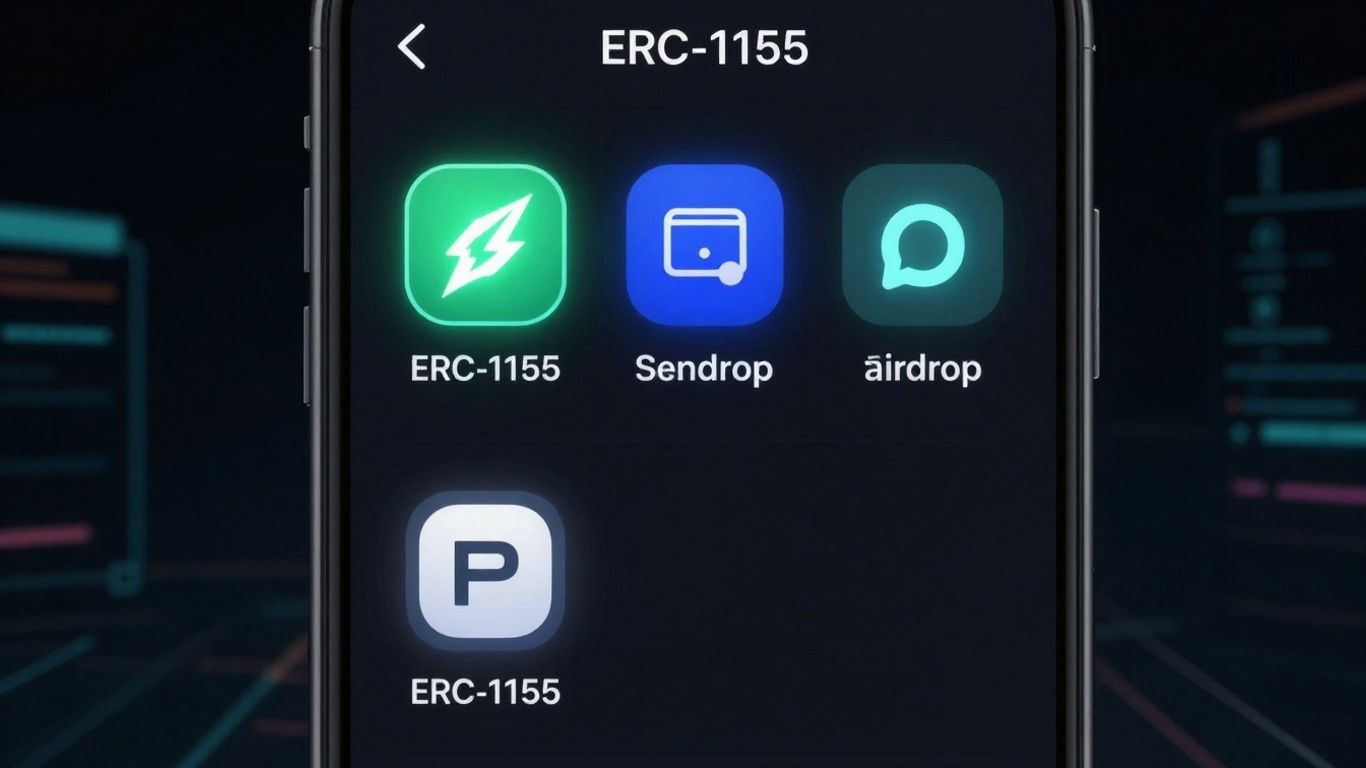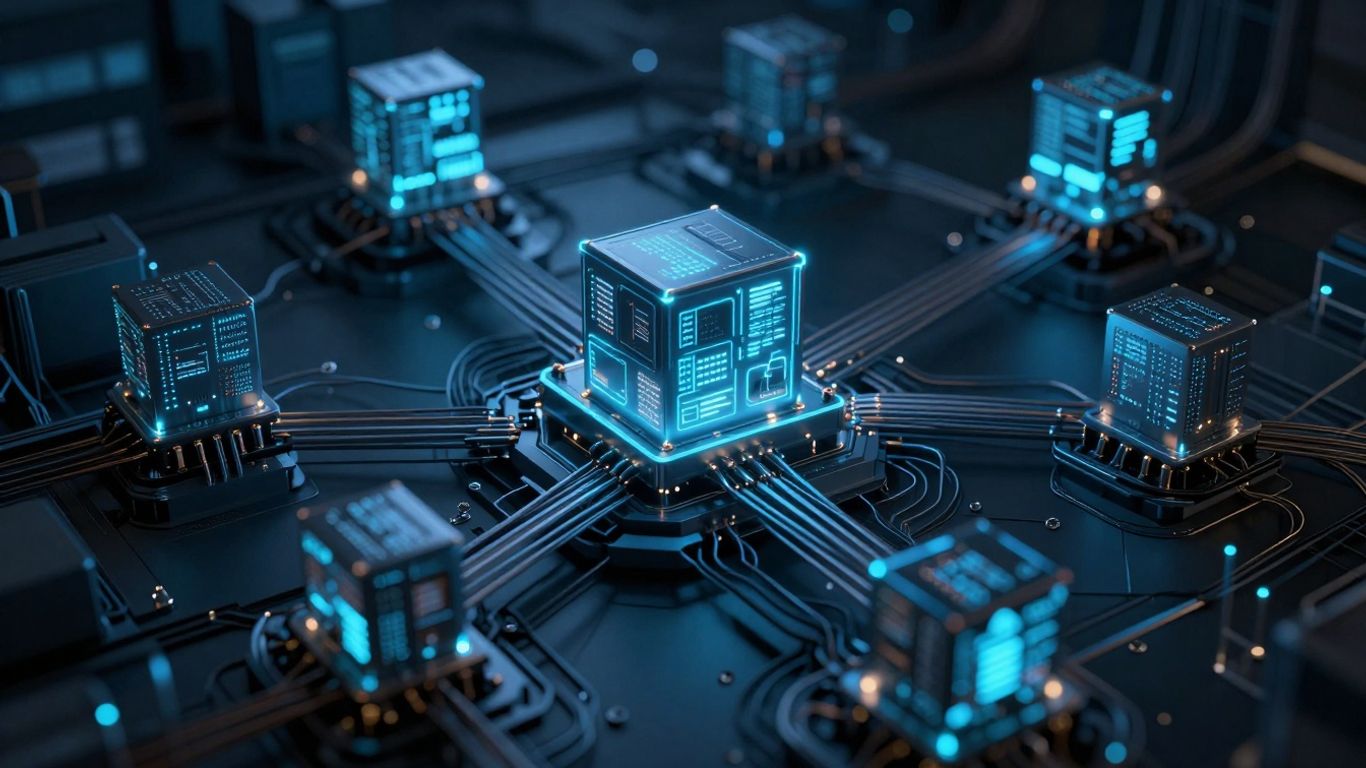[ newsletter ]
Stay ahead of Web3 threats—subscribe to our newsletter for the latest in blockchain security insights and updates.
Thank you! Your submission has been received!
Oops! Something went wrong. Please try again.
Explore how AI in blockchain transforms security, efficiency, and data management across industries.





Artificial Intelligence (AI) and Blockchain are two powerful technologies that, when combined, could reshape our future. Each has its own strengths, but together they can tackle challenges that neither could solve alone. From enhancing security to improving transaction efficiency, the partnership between AI and blockchain is paving the way for innovative solutions across various industries. In this article, we will explore how AI in blockchain is transforming our world and what it means for the future.
AI and blockchain, two big deals on their own, are now teaming up to do some pretty cool stuff. AI is good at making decisions and helping people, while blockchain is like a super-safe digital notebook. Put them together, and you've got something that can really shake things up across different fields. The combined market size of AI and blockchain is expected to exceed $703 million by 2025, witnessing a CAGR of 25.3% from 2020 to 2025.
So, how do AI and blockchain actually work together? Well, AI can make blockchain smarter. For example, AI can analyze all the data on a blockchain to spot patterns or predict what might happen next. Blockchain, on the other hand, can make AI more trustworthy. Because everything on a blockchain is recorded and can't be changed, you can be sure that the data AI is using is legit. It's like having a super-smart detective working with an unhackable vault.
There are a bunch of good things that come from putting AI and blockchain together:
Think of it this way: AI is the brains, and blockchain is the backbone. AI can process information and make decisions, while blockchain makes sure everything is secure and transparent. Together, they can solve problems that neither could handle alone.
It's not all sunshine and roses, though. Getting AI and blockchain to work together can be tricky. Here are some of the problems:
Blockchain is pretty secure, right? Well, it's not perfect. That's where AI comes in. AI can make blockchain even more secure. It's like adding an extra layer of protection to something already pretty well-guarded. Think of it as AI being the security guard for the security system.
AI brings some serious muscle to blockchain security. We're talking natural language processing, image recognition, and real-time data transformation. It's like giving blockchain superpowers. This helps data miners turn big systems into smaller, more manageable environments, optimizing data transactions with flexibility. It's all about making things safer and more efficient.
AI's ability to analyze tons of data in real-time is a game-changer. It can spot threats and anomalies way faster than any human could. It's like having a super-attentive watchdog that never sleeps. This proactive approach to threat detection means potential problems can be nipped in the bud before they cause any real damage. It's about staying one step ahead of the bad guys.
AI can also help with data privacy and compliance. It can automate the implementation of rules, data, and analytics into compliance using smart contracts. This helps get high-quality data in real-time without messing with data privacy and security. It's about making sure everything is above board and by the book.
AI and blockchain together can really change the game when it comes to security. It's not just about making things more secure; it's about making them smarter, more efficient, and more compliant. It's a win-win for everyone involved.

Data management is getting a serious upgrade thanks to the combo of AI and blockchain. It's not just about storing stuff anymore; it's about making data smarter, more accessible, and way more useful. I think it's a game changer.
AI is changing how we handle data on blockchains. Instead of just brute-forcing our way through data mining, AI brings some brains to the operation. It streamlines the whole process, making it less complicated and more efficient. Imagine AI as a smart librarian who knows exactly where every piece of information is and how to get it to you fast. This means less time wasted searching and more time using the data to make smart decisions. It's like going from a messy garage to a well-organized workshop – you can actually find what you need when you need it.
AI can make it easier to get to the data you need. Think about it: right now, finding the right data can be a pain. But with AI, it's like having a personal assistant who knows exactly what you're looking for and can get it to you in seconds. This is especially helpful in industries like healthcare, where quick access to patient data can be life-saving. Plus, with blockchain's security features, you can be sure that the data is safe and hasn't been tampered with. It's a win-win.
AI can dig deeper into blockchain data than ever before. It's not just about storing data; it's about understanding it. AI algorithms can find patterns and insights that humans might miss, leading to better decisions and new opportunities. For example, in finance, AI can analyze transaction data to spot fraud or predict market trends. In supply chain management, it can track products and identify bottlenecks. The possibilities are endless. AI offers solutions to improve efficiency and create smarter systems.
The ability of AI to analyze blockchain data opens up a whole new world of possibilities. It's not just about storing information; it's about extracting knowledge and using it to improve everything from business operations to scientific research.
Blockchain tech is cool, but let's be real, sometimes things move slower than molasses in January. AI is stepping in to change that, promising to make transactions faster, cheaper, and way more automated. It's like giving blockchain a turbo boost.
Okay, so imagine a world where you don't have to wait forever for a transaction to go through. That's the goal. AI can analyze network traffic, predict congestion, and optimize routing to speed things up. Think of it like Google Maps for your crypto, finding the fastest route to get your transaction confirmed. It's not just about speed, it's about making the whole experience smoother.
Transaction fees can be a real drag, especially when things get busy on the blockchain. AI can help cut costs in a few ways. It can automate processes that used to require manual labor, optimize energy consumption for mining, and even predict when fees are likely to be lower. It's like having a personal finance advisor for your blockchain transactions. For example, AI can improve cryptocurrency security by detecting anomalies and preventing fraud, which reduces the need for costly security measures.
Smart contracts are already pretty smart, but AI can make them even smarter. Imagine smart contracts that can adapt to changing conditions, make decisions based on real-time data, and even negotiate terms on their own. It's like giving your smart contracts a brain. This could lead to all sorts of new applications, from automated supply chains to self-managing organizations.
AI can analyze vast amounts of data to identify patterns and predict outcomes, allowing smart contracts to make more informed decisions. This level of automation can significantly reduce the need for human intervention, saving time and resources.
Here's a quick look at how AI can improve smart contracts:
It's interesting to see how AI and blockchain, when put together, can change things in different fields. It's not just about tech; it's about making real improvements in how things work day to day. Let's look at some examples.
AI can help with data security in healthcare, which is a big deal. Think about it: blockchain keeps patient records safe and sound, while AI can analyze that data to find diseases earlier or even personalize treatments. It's like having a super-smart doctor's assistant that never sleeps. Plus, it could speed up research by finding patterns in huge amounts of medical info. It's not perfect, but the potential is huge.
Imagine knowing exactly where every product is, from the factory to your doorstep. That's what AI and blockchain can do for supply chains. Blockchain creates a record that everyone can trust, and AI can use that record to predict delays, optimize routes, and even spot fake products. It's about making things more efficient and transparent, so companies can save money and customers get what they expect.
AI is already changing finance, but blockchain could take it even further. Think about faster, cheaper, and more secure transactions. Blockchain can cut out the middleman, while AI can analyze transactions to prevent fraud and make better investment decisions. It could also help people who don't have access to traditional banking services. It's not a magic bullet, but it could make the financial system more fair and efficient.
The combination of AI and blockchain is not just about improving existing systems; it's about creating entirely new ways of doing things. It's about making industries smarter, more efficient, and more trustworthy.

Okay, so what's next for AI and blockchain? It's a wild ride, honestly. We're seeing some cool stuff pop up. Think about AI helping to make blockchain more scalable. That's a big deal. Right now, blockchain can be slow and clunky, but AI could smooth things out. Also, AI can help with data analysis on the blockchain, making it easier to spot trends and make smarter decisions. It's like giving blockchain a brain boost.
Where could this all go? Everywhere, it seems. Imagine healthcare where AI helps manage and secure patient data on a blockchain. Or supply chains where AI tracks products from start to finish, making sure everything is legit. And don't forget finance. AI could help with fraud detection and algorithmic trading on blockchain-based platforms. The possibilities are pretty much endless. It's all about finding the right problems to solve.
This AI and blockchain thing isn't just a fad. It could seriously change how businesses work. Companies could become more transparent, efficient, and secure. But it's not all sunshine and rainbows. There are challenges, like figuring out the regulations and making sure everything is ethical. But if businesses can navigate those hurdles, they could gain a serious edge. It's like getting a sneak peek into the future of blockchain software development.
The convergence of AI and blockchain is more than just tech hype; it's a shift in how we think about trust, data, and automation. It's about creating systems that are not only efficient but also fair and transparent. This will require a collaborative effort from developers, regulators, and businesses to ensure that these technologies are used responsibly and ethically.
While the fusion of AI and blockchain holds immense promise, it's not without its hurdles. We need to be realistic about what can go wrong and how to address those issues. It's not all sunshine and roses, and ignoring the potential pitfalls would be a mistake.
One of the biggest issues is that both AI and blockchain are complex technologies. Getting them to work together smoothly can be tricky. AI models need a lot of data and computing power, and blockchain, while secure, can be slow and expensive. This mismatch can create bottlenecks. For example, training a sophisticated AI model using data stored on a blockchain might take a very long time and cost a lot of money. Plus, AI algorithms can be vulnerable to attacks, and if an AI system that manages a blockchain is compromised, the entire chain could be at risk. AI offers solutions to the Blockchain scaling challenge by introducing advanced decentralized learning systems and novel data-sharing techniques.
Regulations surrounding both AI and blockchain are still evolving, and the combination of the two creates even more uncertainty. Governments are trying to figure out how to deal with these technologies, and the rules can vary a lot from place to place. This makes it hard for businesses to know what they can and can't do. For example, data privacy laws like GDPR can clash with the way blockchain stores data, and AI algorithms might be subject to bias regulations. It's a legal minefield, and companies need to tread carefully.
AI and blockchain raise some serious ethical questions. AI algorithms can be biased, leading to unfair or discriminatory outcomes. If these algorithms are used in blockchain applications, those biases can be amplified and hard to correct. Also, the transparency of blockchain can conflict with the need for privacy, especially when dealing with sensitive data. It's important to think about the ethical implications of these technologies and make sure they're used responsibly. We need to consider things like:
It's important to remember that AI and blockchain are tools, and like any tool, they can be used for good or bad. It's up to us to make sure they're used in a way that benefits society as a whole. We need to have open and honest conversations about the ethical implications of these technologies and develop guidelines and regulations that promote responsible innovation. BSV-based smart contracts can automatically manage intellectual property (IP) outcomes, ensuring fair, data-driven decision-making without centralized control.
As we wrap up, it’s clear that the mix of AI and blockchain is set to change the game in many areas. They’re not just two separate technologies anymore; they’re becoming a powerful duo that can tackle some big challenges. From making transactions faster and safer to giving people more control over their data, the possibilities are huge. Sure, there are hurdles to overcome, but the potential for innovation is exciting. As we move forward, keeping an eye on how these technologies evolve together will be key. It’s a journey worth watching, and who knows what amazing solutions we’ll see next!
AI and blockchain work together to improve security and efficiency. AI helps analyze data and make smart decisions, while blockchain keeps that data safe and transparent.
AI adds extra security by detecting threats in real-time and helping to manage data privacy, making blockchain systems safer against attacks.
AI can make data management easier by organizing data better, allowing quick access, and providing insights through analysis.
AI can find the fastest way to process transactions, reducing the time and cost involved in blockchain transactions.
Industries like healthcare, supply chain, and finance are using AI and blockchain to improve their services and operations.
There are technical challenges, regulatory issues, and ethical concerns that need to be addressed when integrating AI with blockchain.


